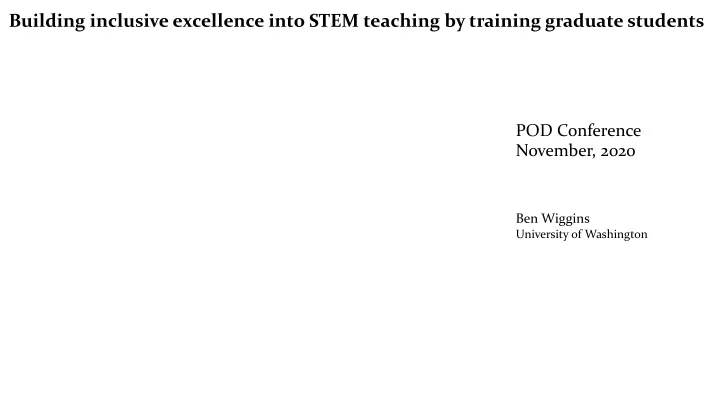

Building inclusive excellence into STEM teaching by training graduate students POD Conference November, 2020 Ben Wiggins University of Washington
Our Problem: Teaching quality in higher education STEM is poor • Teaching is mostly done in traditional formats like passive lecture • Modern best-practices show clear benefits for students from a wide range of under-represented backgrounds. • Why? Inclusive teaching requires funds of knowledge that are deeper, distinct from disciplinary expertise, and require coaching to improve. Two possible solutions: 1. Meet experienced professors where they are and improve empathic active learning skills within a career, or 2. Teach inclusive skills to likely teaching candidates before they enter the professional workforce
A training program for graduate students in STEM will need: • Individualized contact: small team or personal mentoring • Extended training over time: Not just a workshop format • Sustainability: Fits into already-packed PhD program of a graduate student • Practice-based : • Gives opportunities for the development of teaching skills • Gives opportunities for the application of skills into a real classroom
The current STEP-UP model: Timeline for a Cohort of Trainees in the STEP-UP Program Undergraduate class Collegial review by local experts Trainee class sessions sessions taught by Video review and feedback Informal mentoring and material design trainees S P R I N G Q U A R T E R A U T U M N Q U A R T E R W I N T E R Q U A R T E R Official course evaluations Team building and syllabus design Teaching reflection and philosophy exercises Course logistics check-in Focus groups feedback from undergraduates Practice sessions with live audiences http://depts.washington.edu/stepuw/home/step-up
Example list of microskills: A lens on microskills in teaching: • Bringing a class to attention • Leading the description of a single data chart • Giving wait time after posing a question to a group • Revoicing the contribution of a student in discussion • Responding to a student’s incorrect attempt to answer • Framing activities with compelling rationale • Giving compliments in flow • Priming to find what a confused students does know • Probing to find what a confident student does not know • And many, many more… Ways to develop microskills: • Role play • Video review • Team discussion • Mentoring conversations
Using the Design Research model: Funding Year 1 Spring: Co-Teaching Undergrad Courses Autumn: Preparation Course in Teaching Ethnographic Observations: Graduate Students’ Teaching (+ COPUS) Ethnographic Observations: Leveraging Active & Equity Strategies Instructor’s Teaching Moves Engagement w/ Students & Co-Teachers Graduate Student Interactions Introduce & Practice Active & Equitable Teaching Post-Survey: Teaching Self-Efficacy Ratings Pre-Survey: Teaching Self-Efficacy Ratings Focus Group Interview: Reflection on Preparation Previous Teaching Experience Future Career Plans Document Analysis: Structure of Undergrad Course Document Analysis: Alignment of Assessments to Learning Goals Sequence & Structure of Course Type of Feedback from Instructor Winter: Planning & Prep Mid-Survey: Teaching Self-Efficacy Ratings
Research outcomes from the first two cohorts: 1) Group mentoring created an atmosphere for supportive, self-critical change in teaching outlook and practice. Trainees found this especially helpful for learning inclusive methods, and this seems to have been the case because they were able to learn in an environment of trust from the experiences of peers from multiple viewpoints. 2) Direct feedback for graduate trainees from undergraduate students was identified as particularly important for development of confidence and a supportive teaching persona. Trainees indicates that ‘facing the enemy’ prior to their own instruction allowed them a rare opportunity to understand the mindset of their students which proved useful later. 3) Perhaps least surprisingly, trainees repeatedly indicated that an overwhelmingly positive outlook on the part of supervisors was a necessary ingredient .
Next steps for developing this professional development system: • Continue iterative improvement • Incorporate online learning as a basic model • Establish positive feedback loops within administration • Advance beyond research funding to a sustainable program
Acknowledgements: Elaine Klein Innovations in Graduate Education Program #1855841 A wide range of STEM units at UW, most especially the Molecular and Cellular Biology Program Shelley Stromholt The UW STEP-WISE (Working In Science Education) program for post-doctoral scholars Becca Price Please contact us at BENLW@uw.edu with questions! Rich Gardner
Recommend
More recommend